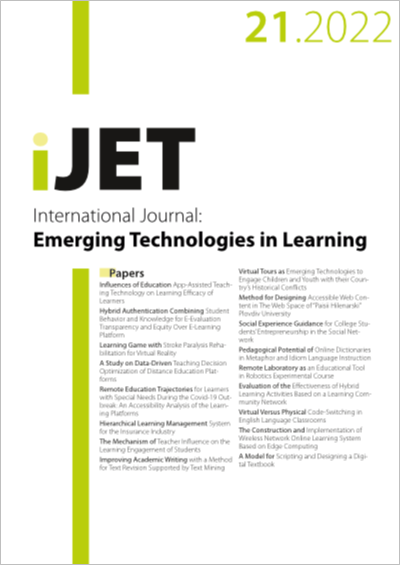Pedagogical Potential of Online Dictionaries in Metaphor and Idiom Language Instruction
DOI:
https://doi.org/10.3991/ijet.v17i21.32445Keywords:
metaphor, idiom, online dictionaries, dictionary skills, multimodalityAbstract
Metaphors are an intrinsic part of thought and language that allow us to construe a cognitive domain in terms of another domain. Metaphors are especially relevant to the study of idioms, inasmuch as idioms are commonly underlain by metaphorical patterns of conceptualization. As figurativeness is a common phenomenon in everyday language, tackling metaphors and idioms effectively in the EFL classroom can enhance students’ metaphoric competence and, consequently, increase their level of linguistic proficiency. This article explores the potential of online dictionaries and the multimodal affordances they bring to the teaching of metaphor and idiom in the language classroom. Dictionary skill descriptors are used to relate task types with idiom and metaphor content in online dictionaries and how it may be used to promote students’ learning of both dictionary skills and metaphoric language understanding. Five dictionary skills descriptors are proposed and illustrated with specific metaphor related tasks that show online dictionary affordances present in six selected online dictionaries. On the whole, this article envisions online dictionaries and their multimodal affordances as a powerful learning tool for steering EFL students through the intricacies of metaphoric language.
Downloads
Published
How to Cite
Issue
Section
License
Copyright (c) 2022 Mari Carmen Campoy-Cubillo, Montserrat Esbrí-Blasco

This work is licensed under a Creative Commons Attribution 4.0 International License.



